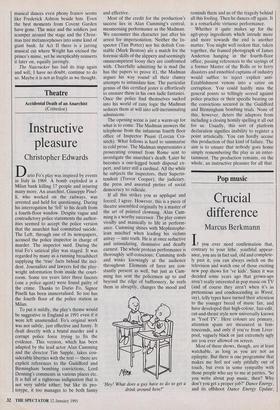Theatre
Accidental Death of an Anarchist (Cottesloe)
Instructive pleasure
Christopher Edwards
Dario Fo's play was inspired by events in Italy in 1969. A bomb exploded in a Milan bank killing 17 people and injuring many more. An anarchist, Giuseppe Pinel- li, who worked on the railways, was arrested and held for questioning. During his interrogation he 'fell' to his death from a fourth-floor window. Despite vague and contradictory police statements the author- ities seemed to accept the police version that the anarchist had committed suicide. The Left, through one of its newspapers, accused the police inspector in charge of murder. The inspector sued. During the trial Fo's satirical play was staged. It was regarded by many as a running broadsheet supplying the 'true' facts behind the inci- dent. Journalists and lawyers fed the play- wright information from inside the court- room. Some ten years later three fascists (one a police agent) were found guilty of the crime. Thanks to Dario Fo, Signor Pinelli has been immortalised. So too has the fourth floor of the police station in Milan.
To put it mildly, the play's theme would be suggestive in England in 1991 even if it were left unamended. Fo's original work was not subtle, just effective and funny. It dealt directly with a brutal murder and a corrupt police force trying to fix the evidence. This version, which has been adapted by the lead actor Alan Cumming and the director Tim Supple, takes con- siderable liberties with the text — there are explicit references to the Guildford and Birmingham bombing convictions, Lord Denning's comments in various places etc. It is full of a righteous indignation that is not very subtle either; but like its pro- totype, it too manages to be both funny and effective.
Most of the credit for the production's success lies in Alan Cumming's central, mesmerising performance as the Madman. We encounter this character just after his arrest for impersonation. Neither the In- spector (Tim Potter) nor his doltish Con- stable (Mark Benton) ai'e a match for the forensic skills of the slippery and seemingly omnicompetent loony they are confronted with. Cheerfully admitting he is mad (he has the papers to prove it), the Madman argues his way round all their clumsy attempts to intimidate him. The particular genius of this certified jester is effortlessly to ensnare them in his own ludic fantasies. Once the police find themselves sucked into his world of zany logic the Madman seduces them at will into self-incriminating admissions.
The opening scene is just a warm-up for what is to come. The Madman answers the telephone from the infamous fourth floor office of Inspector Pisani (Lorcan Cra- nitch). What follows is hard to summarise in cold prose. The Madman impersonates a prosecuting counsel from Rome sent to investigate the anarchist's death. Later he becomes a one-legged bomb disposal ex- pert, and later still a cardinal. All the while he subjects the inspectors, their Superin- tendent (Trevor Cooper), the judiciary, the press and assorted pieties of social democracy to. ridicule.
If all this strikes you as appliqué and forced, I agree. However, this is a piece of theatre assembled originally by a master of the art of pointed clowning. Alan Cum- ming is a worthy successor. The play comes vividly and manically to life in perform- ance. Cumming shines with Mephistophe- lean mischief when leading his victims astray — into truth. He is at once seductive and intimidating, dismissive and deadly earnest. The whole protean performance is thoroughly self-conscious; Cumming nods and winks knowingly at the audience throughout. Elements of farce are con- stantly present as well, but just as Cum- ming has sent the policemen up to and beyond the edge of buffoonery, he reels them in abruptly, changes the mood and `Hey! What does a guy have to do to get a drink around here?' reminds them and us of the tragedy behind all this fooling. Then he dances off again. It is a remarkable virtuoso performance.
Whether it quite makes up for the agit-prop ingredients which intrude more and more towards the end is another matter. You might well reckon that, taken together, the framed photograph of James Anderton hanging in the fourth-floor office, passing references to the sayings of a former Master of the Rolls or to ferry disasters and ennobled captains of industry would suffice to inject explicit anti- Establishment venom into a satire on corruption. You could hardly miss the general points so tellingly scored against police practice or their specific bearing on the convictions secured in the Guildford and Birmingham bombing trials. None of this, however, deters the adaptors from including a closing homily spelling it all out for us. Usually, this sort of platform declaration signifies inability to register a point artistically. You can hardly accuse this production of that kind of failure. The aim is to ensure that nobody goes home simply remembering the play as an enter- tainment. The production remains, on the whole, an instructive pleasure for all that.










































 Previous page
Previous page